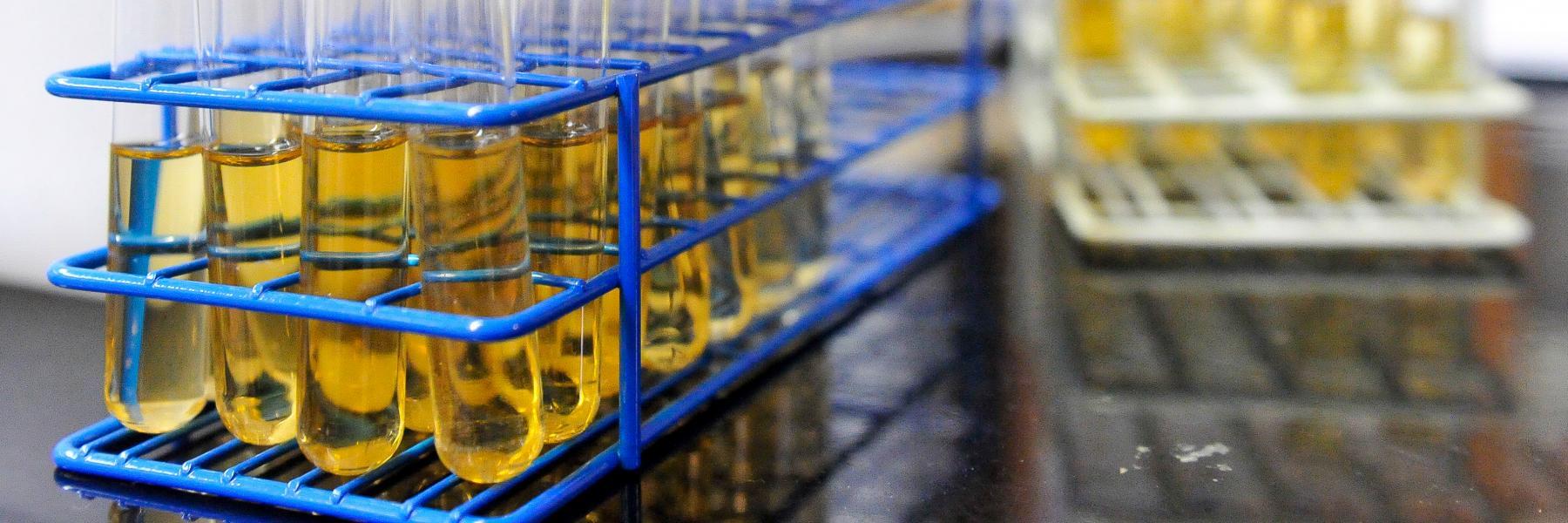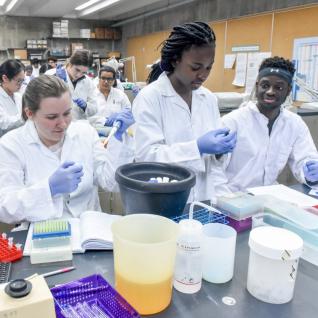Molecular Biology & Biotechnology Specialist (HBSc)
Admissions Category: Life Sciences
Are you a prospective student applicant?
You can enter the Health Sciences Stream to accelerate your career in a health care profession

Program Overview
This program first establishes foundational knowledge across the major disciplines of biology, and then combines this knowledge with increasingly molecular, analytical and reflective approaches to the study of Biology. This is a laboratory-rich program that integrates an understanding of chemical and physical processes within our complex biological systems. Broad training in biology and rigorous ancillary training in cognate disciplines, positions graduates to apply to professional and graduate schools or work in a broad range of government regulatory agencies, clinical, or research-focused industries. Co-op terms provide full-time work placements in laboratories, government, health care, or public and private industry. Placements help students both define and refine their career goals while providing invaluable work experience.
Complementary Programs:
N/A
Check out future career opportunities and skills acquired from completing this program:
Competencies & Skills
- RESEARCH: Experimental design, data analysis using statistics, critical interpretation of literature, advanced experimental techniques in molecular biology
- COMMUNICATION: Written, oral, poster, debate, multimedia
- CAPACITY: Teamwork skills, meet deadlines and expectations
- VALUES: Advocate for Biology & fundamental research
Careers for Graduates
- Academic Research Scientist
- Clinical Research Assistant
- Laboratory Research Associate (university, hospital, industry)
- Laboratory Technician for Clinical Trials
- Coordinator or Researcher
- Biotechnologist
- Pharmaceuticals (Research, Development, Sales)
- Food Science
- Quality Control & Inspection
- Healthcare Professional
Further Education
- Graduate Studies
- Medicine, Dentistry, Pharmacy, Nursing, Optometry
- Genetic Counselling
- Physical Therapy, Occupational Therapy
- Teacher Education
- Clinical Research
- Medical Laboratory Technology
- Radiology Technologist (MRI, CT)
Program Pathway
Year 1 | Year 2 | Year 3 | Year 4Choose Your Courses Wisely
- Use Degree Explorer planner and the UTSC Calendar to plan your degree.
Develop Your Academic & Research Skills
- Attend Biology Students Association (BioSA) BioAID Review Sessions for guidance with writing lab reports.
- Contact the UTSC Library for in-depth research assistance for your assignments; writing support is also available at the CTL Writing Centre.
- Attend your professors’ office hours.
Apply Theory to Practice
- Attend the Professor-Student Mix & Mingle to meet many of the professors you will encounter as you progress through your degree.
- Start building your Co-Curricular Record (CCR) and search for Experiential Learning and Work-Integrated Learning opportunities on CLNx.
Become an Engaged Citizen (Locally & Globally)
- Join BioSA and attend their activities and events.
- Join a professional student organization like Future Black Physicians, Health Occupation Students of America UTSC, or MEDLIFE.
- Build confidence and self-esteem through Department of Student Life’s (DSL) LEAD program.
- Develop leadership skills through DSL’s Alternative Reading Week .
Plan for Your Future Career
- It is important to establish a healthy school/life balance.
- Volunteer with organizations to explore your interest in industries related to your program of study; check listings on CLNx (>Jobs & Recruitment).
- Attend the UTSC Get Experience Fair in September or register with Scarborough Campus Student Union’s (SCSU) Volunteer Network Program.
Year 2
Choose Your Courses Wisely
- 3.0 from Biology Core Courses: BIOB10H3, BIOB11H3, BIOB34H3, BIOB38H3, BIOB50H3, BIOB51H3.
- 0.5 from BIOB12H3.
- 1.0 from Organic Chemistry Courses: CHMB41H3, CHMB42H3.
- Check Degree Explorer and contact your program advisor.
Develop Your Academic & Research Skills
- Seek support from professors and TAs during office hours.
- Check the Research Catalogue on CLNx for possible research opportunities.
- Volunteer in research labs, hospitals, doctors offices, community organizations, foundations.
- Consider doing a directed research course (BIOB98).
Apply Theory to Practice
- Take part in Conversation with Biologists, an event where students can interact with leading scientists and learn about their research and career trajectory.
- Consider Work Study (>Jobs & Recruitment>Work Study) jobs or take a directed supervised research course (e.g., BIOB98).
Become an Engaged Citizen (Locally & Globally)
- Build your official CCR by getting involved outside the classroom, eg., get involved with the Scarborough Pre-Med Society or the Medical Education Association.
- Consider participating in local science outreach through organizations like Let’s Talk Science or consider Global Learning opportunities through ISC.
Plan for Your Future Career
- Gain experience by applying for a summer, part-time or Work Study position via CLNx (>Jobs & Recruitment).
- Speak to professors and program advisors so you know what to keep in mind for grad school.
- Explore careers through AA&CC’s Job Shadowing and In The Field programs.
- Apply for DSL’s All-In Leadership program.
Year 3
Choose Your Courses Wisely
- 2.5 credits of Biology Foundation courses: BIOC15H3, BIOC17H3, BIOC37H3 or BIOC40H3, BIOC54H3, BIOC61H3.
- 1.0 credit of Advanced Courses in Cellular and Organismal Biology.
- Complete BIOC90H3.
- Use Degree Explorer to ensure you are on track with your degree.
Develop Your Academic & Research Skills
- Consider entering the following Research Awards Contests: UTSC Library Undergraduate Research Prize, Mitacs Globalink, NSERC USRA, TD Undergraduate Research Opportunity Fellowship.
- Continue to build your volunteer and work experience.
- Consider directed research courses: BIOB98, BIOC99 and take part in our departmental information session.
Apply Theory to Practice
- Continue to build on your skills and knowledge through relevant events offered through your department, student groups, DSL and the AA&CC.
- Consider being a peer reviewer for the Journal of Natural Sciences.
Become an Engaged Citizen (Locally & Globally)
- Attend Diversity in Medicine Seminar (for future medical students).
- Volunteer with DSL to be a First Year Peer Advisor. Take part in other DSL activities, such as Indigenous Experiential Journey trip, or intern with an NGO with the Queen Elizabeth II Diamond Jubilee Scholarship Program.
- Attend a Café Scientifique in your local community.
Plan for Your Future Career
- Speak with a staff member at the AA&CC to plan a potential career path.
- Check CLNx for networking events and employer information sessions.
- Attend the Graduate & Professional School Fair in September.
- Join a conference like TEDxUTSC or International Development Conference to develop professional skills.
Year 4
Choose Your Courses Wisely
- 0.5 Credit in Advanced Molecular Techniques: BIOD21H3.
- 0.5 credit D-level Research-oriented “Cell & Molecular” Course Work from selected courses on Degree Explorer.
- Use Degree Explorer to ensure you are on track to graduate.
- Register your “Intent to Graduate” on ACORN by the deadline.
Develop Your Academic & Research Skills
- Attend weekly Biology Seminar Series (Fridays 12pm).
- Submit to UTSC’s Journal of Natural Sciences.
- Apply for an Academic Travel Fund through DSL to research, present at a conference, or engage with the international academic community.
Apply Theory to Practice
- Participate in Ontario’s Synapse Life Science competition.
Become an Engaged Citizen (Locally & Globally)
- Participate in the AA&CC’s Partners in Leadership program to learn and network with an alumni mentor about transitioning to work or further education.
- Consider joining a relevant professional association such as the American Society of Cell Biology or the American Society of Microbiology that take student members, and volunteer for their events.
Plan for Your Future Career
- Attend the AA&CC’s Get Hired job search conference in April/May.
- Attend the Jobs for Grads orientation for a job search “crash course”; find job opportunities on CLNx.
- Discuss grad school plans early with staff at the AA&CC and your professors.
- Get your Personal Statement reviewed in the AA&CC.
